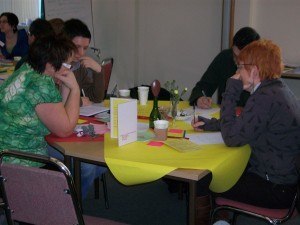Whilst I want to encourage the use of participative methods, I don’t want to imply they are easy. These posts about community development draw attention to a variety of participatory methods. My message is experiment, acknowledge your limitations and you will improve over time. Share leadership and work with others when you can.
World Cafe can be more flexible and straightforward than open space technology. Broadly people sit in small groups around tables, discuss a topic which might be the same for each table or vary from table to table. From time to time people move around, leaving one person behind to introduce new people to what was discussed earlier This mixes insights from several tables.
Some Issues to Consider
Furniture and Paraphernalia
The main difficulty (apart from actually being participative!) is resources. You need to accommodate everyone in a single large room around small tables, 4 at each table is ideal. You also need flipchart paper and various flowers, sweets, toys, information sheets to encourage the right sort of atmosphere (You don’t need all this stuff but it helps some people). One advantage of working with churches is there is no shortage of large rooms. The ubiquitous trestle tables can be a bit of a problem but the method can work quite well with them. Round tables optimise distance and so help with hearing and of course look better.
Hearing
Hearing can be a problem. If tables are close together and there are a lot of them, background noise can be a real problem for some people. (Me included!) The size of tables is relevant: groups of 12 around vast tables are impossible because everyone has to shout to be heard. Use the loop or PA system to clearly set the task and ask people to make sure everyone has a say. Large sheets of flipchart paper where participants can record the conversation, can help with hearing (and will help more people than you think).
Keeping Track
With large sheets of paper and plenty of pens, people can share ideas and they serve as an aide memoire when people move around. They can be pinned to walls to share conclusions at the end. If you can’t manage all the other paraphernalia, do make sure pens and large A1 sheets are available.
For more information, take a look at my previous post about World Cafe that includes some resources.
Some people relate to issues by thinking about them, others through emotions or design and others by playing with things. Have you experience of ideas springing from these different approaches?
